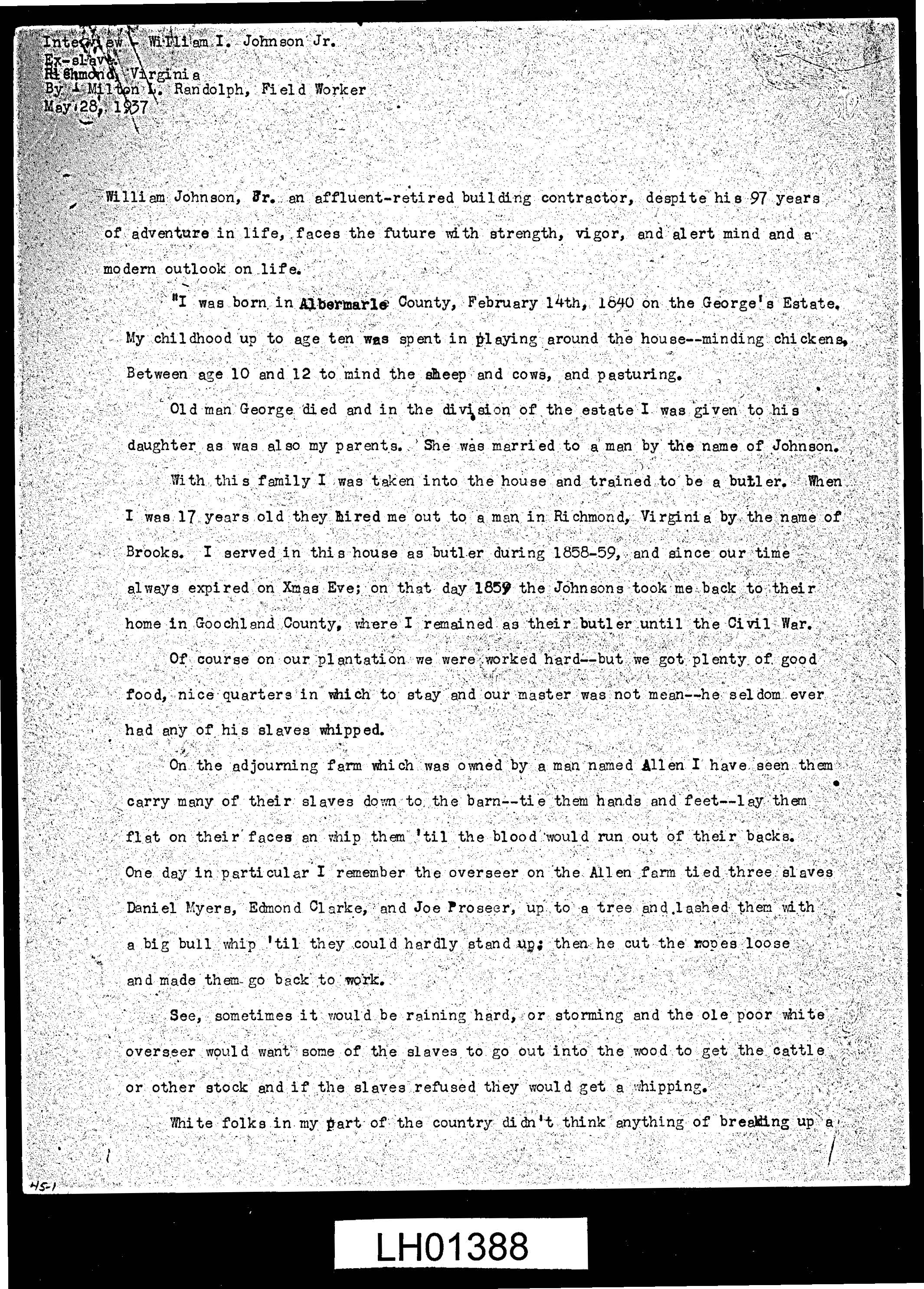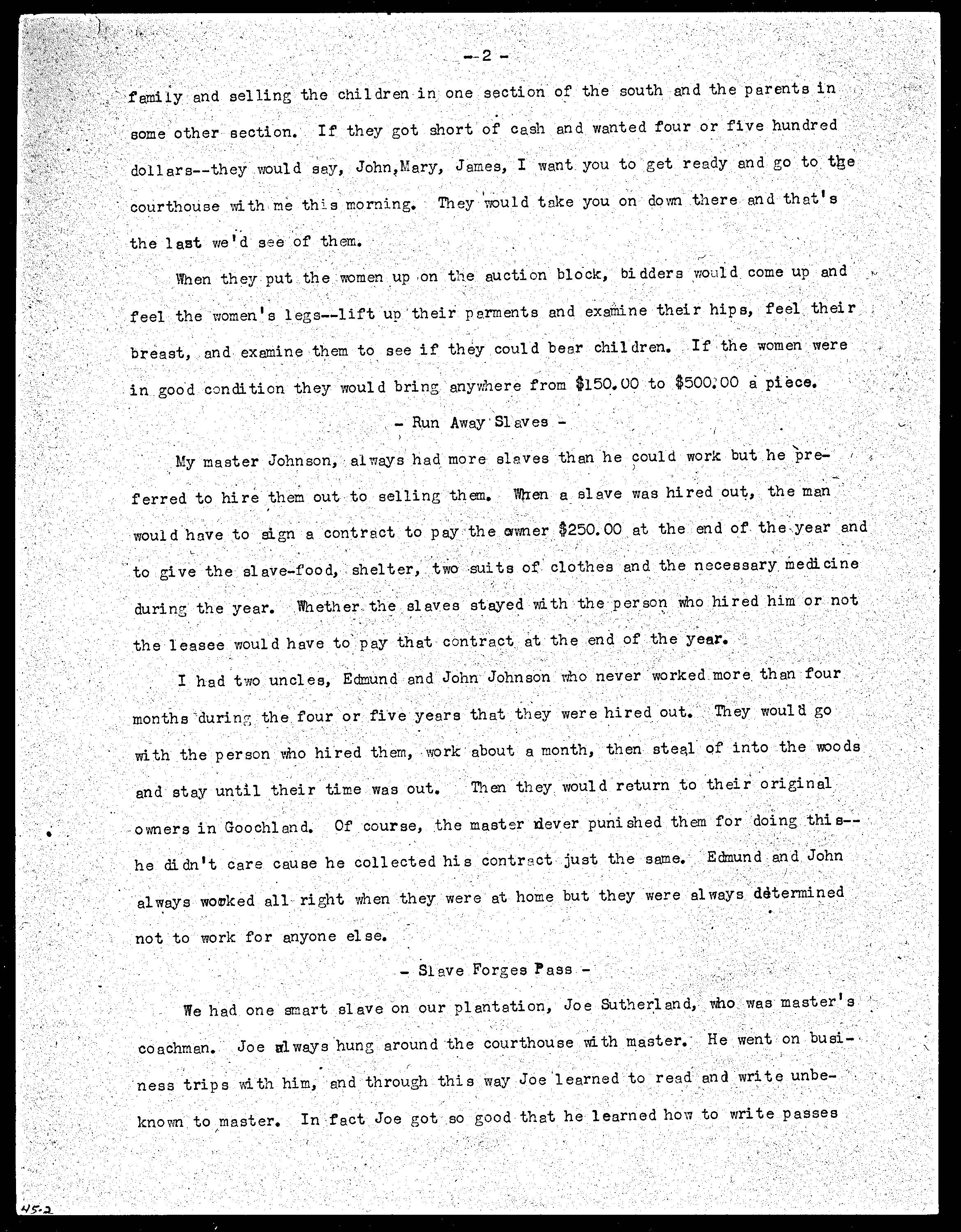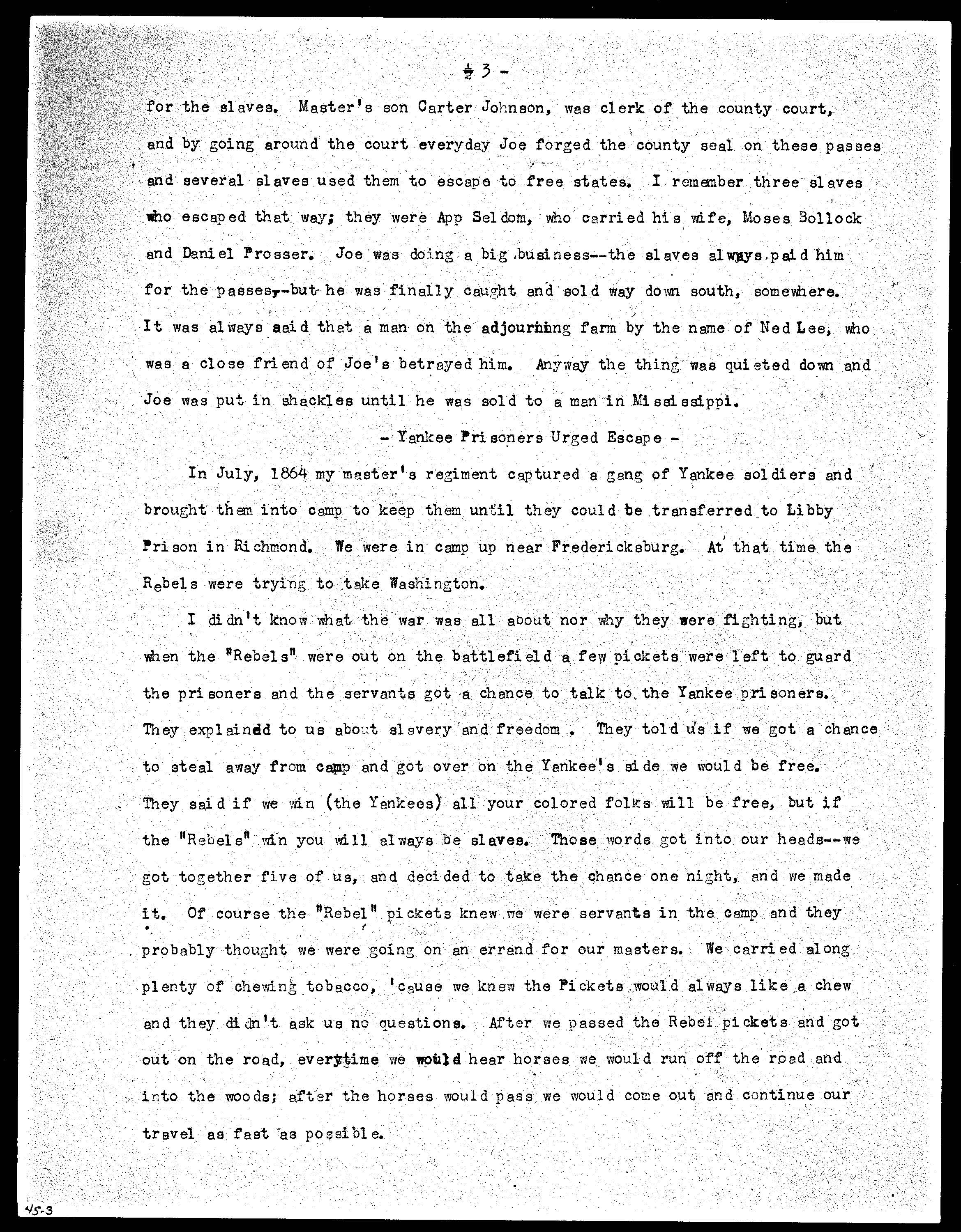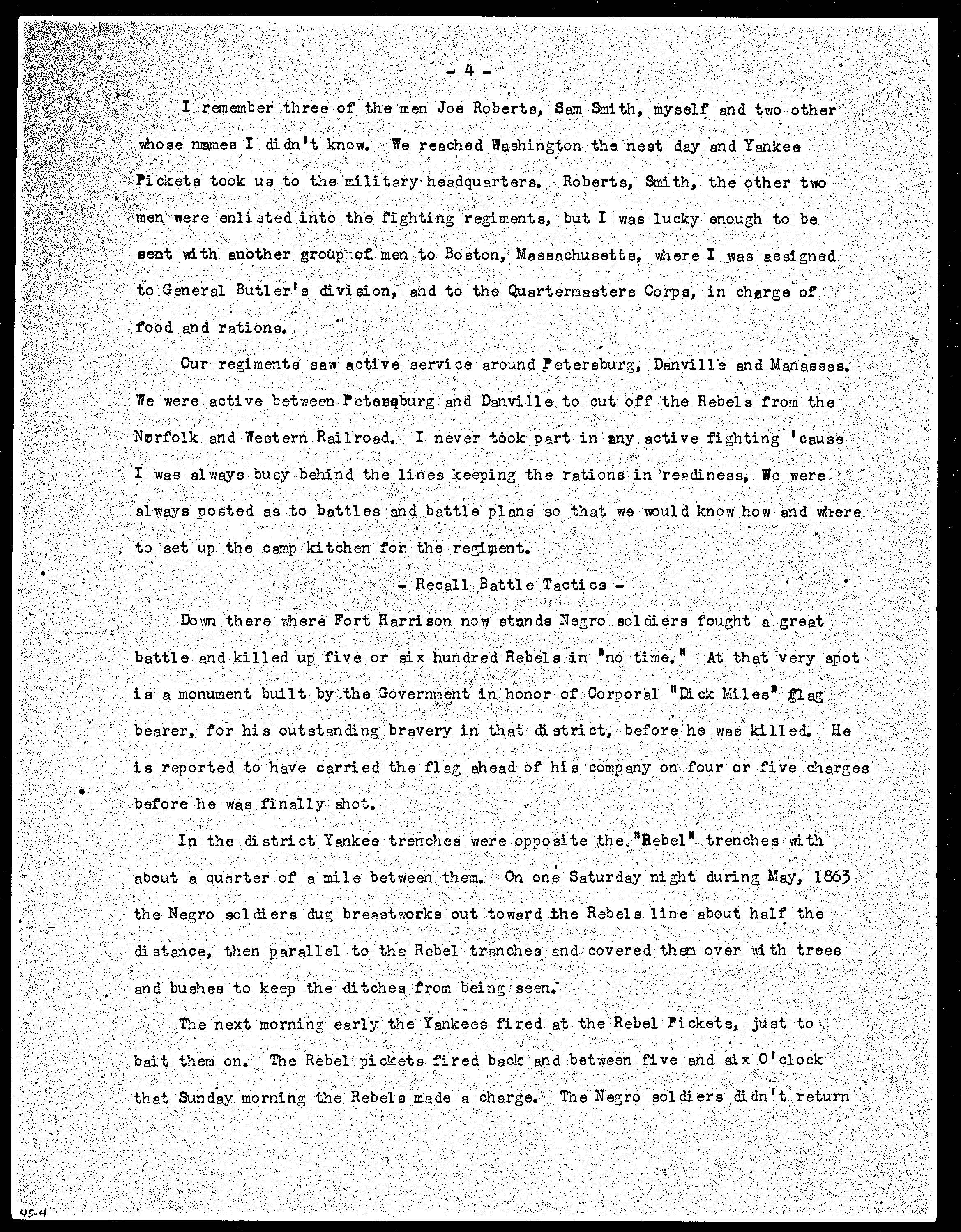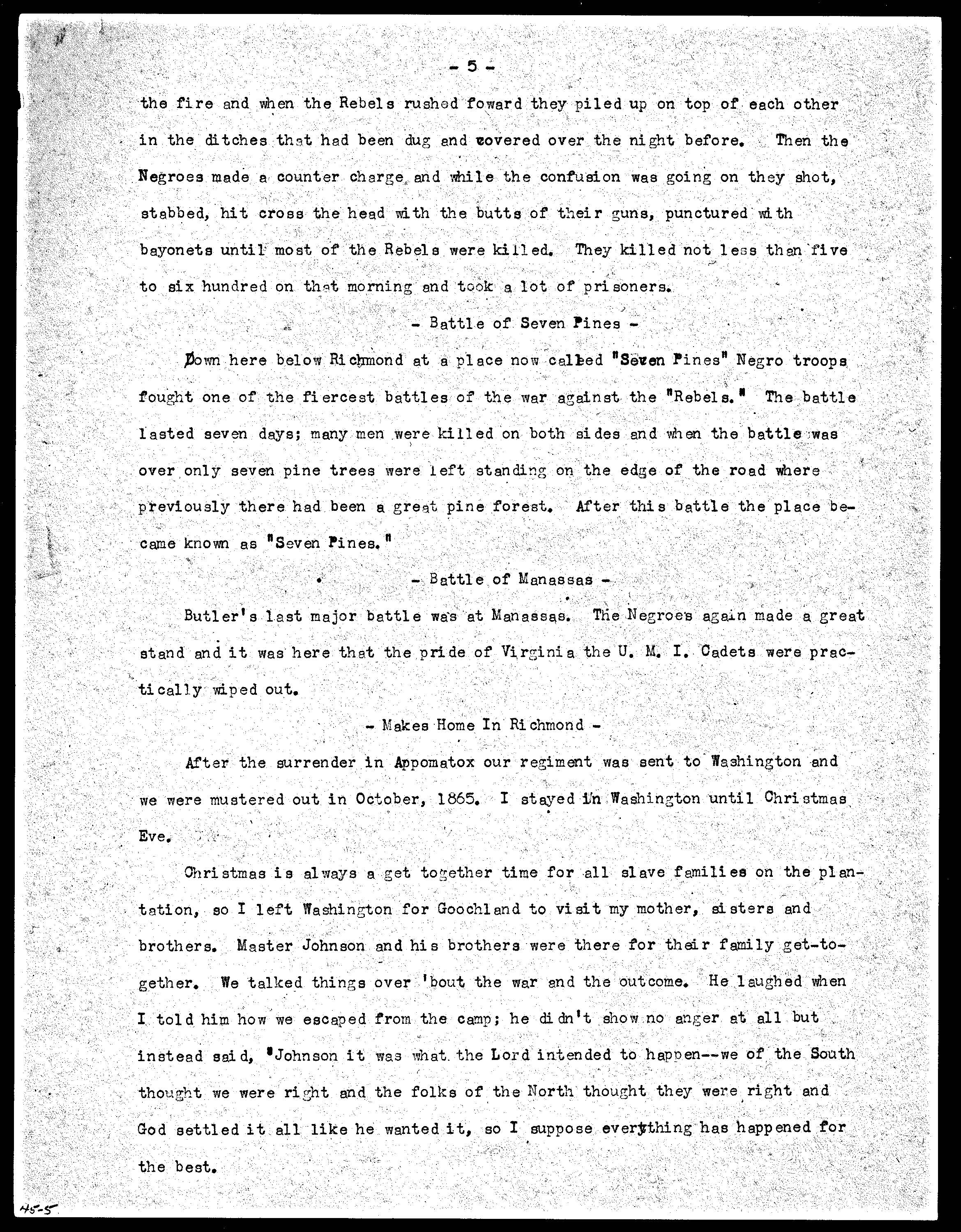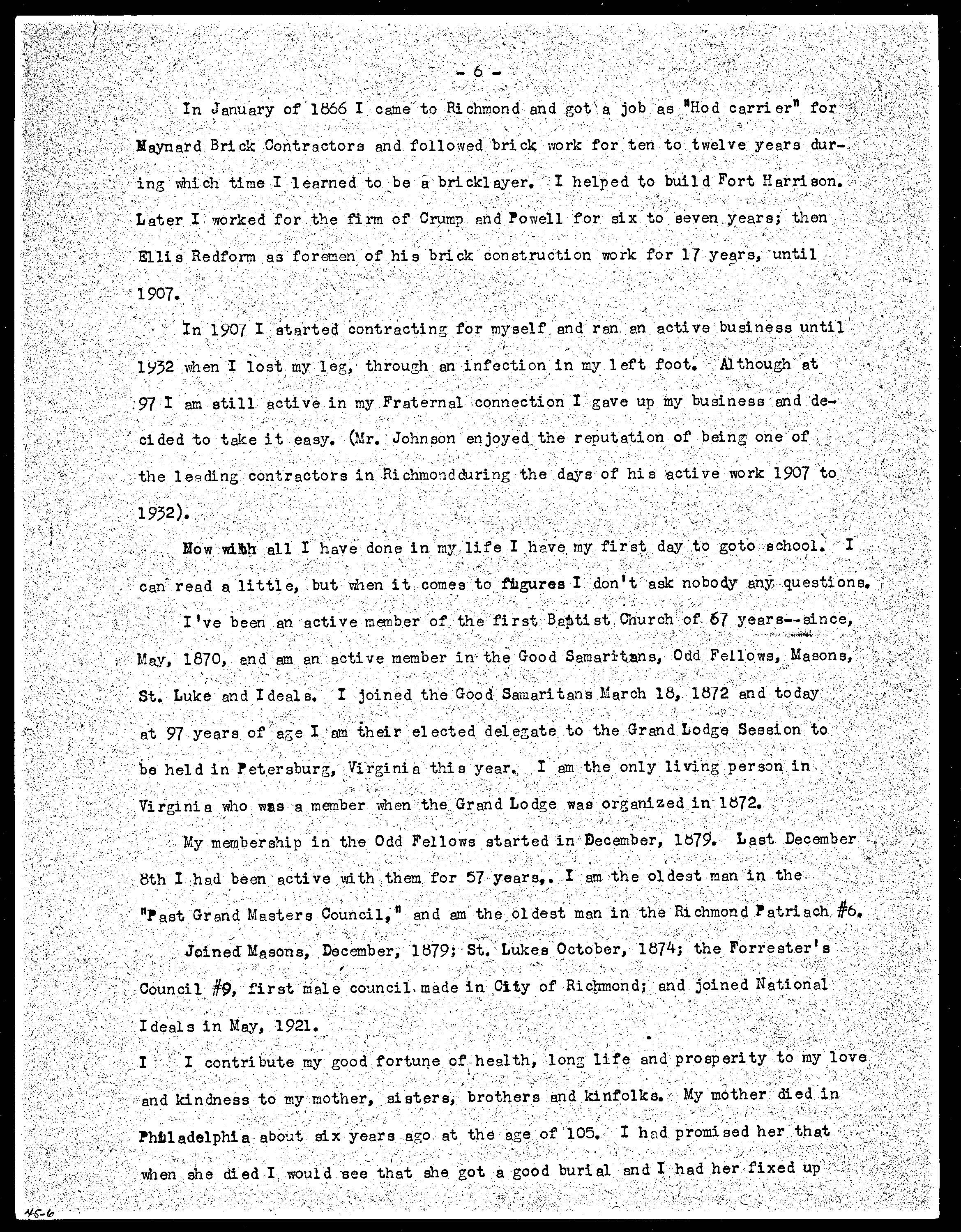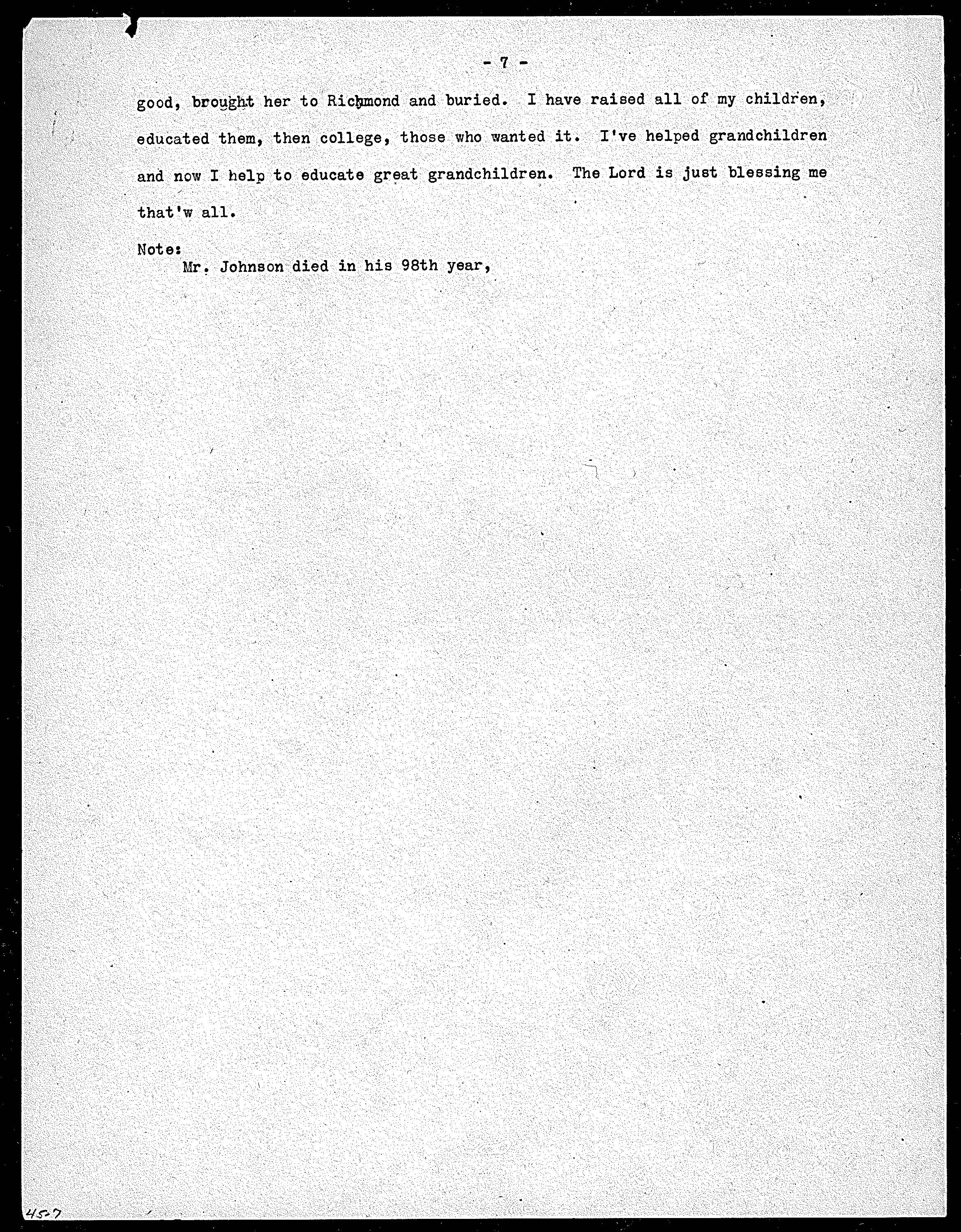In 1937, 97 year-old veteran William I. Johnson told the story of his life to a Works Progress Administration (WPA) interviewer.
Interview - William I. Johnson Jr.
Ex-slave.
Richmond, Virginia
By Milton L. Randolph, Field Worker
May 28, 1937
William Johnson, Jr. an affluent-retired building contractor, despite his 97 years of adventure in life, faces the future with strength, vigor, and alert mind and a modern outlook on life.
“I was born in Albermarle County, February 14th, 1840 on the George’s Estate. My childhood up to age ten was spent in playing around the house—minding chickens. Between age 10 and 12 to mind the sheep and cows, and pasturing.
Old man George died and in the division of the estate I was given to his daughter as was also my parents. She was married to a man by the name of Johnson.
With this family I was taken into the house and trained to be a butler. When I was 17 years old they hired me out to a man in Richmond, Virginia by the name of Brooks. I served in this house as butler during 1858-59, and since our time always expired on Xmas Eve; on that day 1859 the Johnsons took me back to their home in Goochland County, where I remained as their butler until the Civil War.
Of course on our plantation we were worked hard—but we got plenty of good food, nice quarters in which to stay and our master was not mean—he seldom ever had any of his slaves whipped.
On the adjourning farm which was owned by a man named Allen I have seen them carry many of their slaves down to the barn—tie them hands and feet—lay them flat on their faces an[d] whip them ‘til the blood would run out of their backs. One day in particular I remember the overseer on the Allen farm tied three slaves Daniel Myers, Edmond Clarke, and Joe Proseer, up to a tree and lashed them with a big bull whip ‘til they could hardly stand up; then he cut the ropes loose and made them go back to work.
See, sometimes it would be raining hard, or storming and the ole poor white overseer would want some of the slaves to go out into the wood to get the cattle or other stock and if the slaves refused they would get a whipping.
White folks in my part of the county didn’t think anything of breaking up a family and selling the children in one section of the south and the parents in some other section. If they got short of cash and wanted four or five hundred dollars—they would say, John, Mary, James, I want you to get ready and go to the courthouse with me this morning. They would take you on down there and that’s the last we’d see of them.
When they put the women up on the auction block, bidders would come up and feel the women’s legs—lift up their [g]arments and examine their hips, feel their breast, and examine them to see if they could bear children. If the women were in good condition they would bring anywhere from $150.00 to $500.00 a piece.
- Run Away Slaves -
My master Johnson, always had more slaves than he could work but he preferred to hire them out to selling them. When a slave was hired out, the man would have to sign a contract to pay the owner $250.00 at the end of the year end to give the slave-food, shelter, two suits of clothes and the necessary medicine during the year. Whether the slaves stayed with the person who hired him or not the leasee would have to pay that contract at the end of the year. I had two uncles, Edmund and John Johnson who never worked more than four months during the four or five years that they were hired out. They would go with the person who hired them, work about a month, then steal of[f] into the woods and stay until their time was out. Then they would return to their original owners in Goochland. Of course, the master never punished them for doing this—he didn’t care cause he collected his contract just the same. Edmund and John always worked all right when they were at home but they were always determined not to work for anyone else.
- Slave Forges Pass -
We had one smart slave on our plantation, Joe Sutherland, who was master’s coachman. Joe always hung around the courthouse with master. He went on business trips with him, and through this way Joe learned to read and write unbeknown to master. In fact Joe got so good that he learned how to write passes for the slaves. Master’s son Carter Johnson, was clerk of the county court, and by going around the court everyday Joe forged the county seal on these passes and several slaves used them to escape to free states. I remember three slaves who escaped that way; they were App Seldom, who carried his wife, Moses Bollock and Daniel Prosser. Joe was doing a big business—the slaves always paid him for the passes,—but he was finally caught and sold way down south, somewhere. It was always said that a man on the adjourning [adjoining] farm by the name of Ned Lee, who was a close friend of Joe’s betrayed him. Anyway the thing was quieted down and Joe was put in shackles until he was sold to a man in Mississippi.
- Yankee Prisoners Urged Escape -
In July, 1864 my master’s regiment captured a gang of Yankee soldiers and brought them into camp to keep them until they could be transferred to Libby Prison in Richmond. We were in camp up near Fredericksburg. At that time the Rebels were trying to take Washington.
I didn’t know what the war was all about nor why they were fighting, but when the “Rebels” were out on the battlefield a few pickets were left to guard the prisoners and the servants got a chance to talk to the Yankee prisoners. They explained to us about slavery and freedom. They told us if we got a chance to steal away from camp and got over on the Yankee's side we would be free. They said if we win (the Yankees) all your colored folks will be free, but if the “Rebels” win you will always be slaves. Those words got into our heads—we got together five of us, and decided to take the chance one night, and we made it. Of course the “Rebel” pickets knew we were servants in the camp and they probably thought we were going on an errand for our masters. We carried along plenty of chewing tobacco, ‘cause we knew the Pickets would always like a chew and they didn’t ask us no questions. After we passed the Rebel pickets and got out on the road, everytime we would hear horses we would run off the road and into the woods; after the horses would pass we would come out and continue our travel as fast as possible.
I remember three of the men Joe Roberts, Sam Smith, myself and two other[s] whose names I didn't know. We reached Washington the ne[x]t day and Yankee Pickets took us to the military headquarters. Roberts, Smith, the other two men were enlisted into the fighting regiments, but I was lucky enough to be sent with another group of men to Boston, Massachusetts, where I was assigned to General Butler’s division, and to the Quartermasters Corps, in charge of food and rations.
Our regiments saw active service around Petersburg, Danville and Manassas. We were active between Petersburg and Danville to cut off the Rebels from the Norfolk and Western Railroad. I never took part in any active fighting ‘cause I was always busy behind the lines keeping the rations in readiness. We were always posted as to battles and battle plans so that we would know how and where to set up the camp kitchen for the regiment.
- Recall Battle Tactics -
Down there where Fort Harrison now stands Negro soldiers fought a great battle and killed up five or six hundred Rebels in “no time.” At that very spot is a monument built by the Government in honor of Corporal “Dick Miles” flag bearer, for his outstanding bravery in that district, before he was killed. He is reported to have carried the flag ahead of his company on four or five charges before he was finally shot.
In the district Yankee trenches were opposite the “Rebel” trenches with about a quarter of a mile between them. On one Saturday night during May, 1863 the Negro soldiers dug breastworks out toward the Rebels line about half the distance, then parallel to the Rebel tr[e]nches and covered them over with trees and bushes to keep the ditches from being seen.
The next morning early the Yankees fired at the Rebel Pickets, just to bait them on. The Rebel pickets fired back and between five and six O’clock that Sunday morning the Rebels made a charge. The Negro soldiers didn’t return the fire and when the Rebels rushed forward they piled up on top of each other in the ditches that had been dug and covered over the night before. Then the Negroes made a counter charge and while the confusion was going on they shot, stabbed, hit across the head with the butts of their guns, punctured with bayonets until most of the Rebels were killed. They killed not less than five to six hundred on that morning and took a lot of prisoners.
- Battle of Seven Pines -
Down here below Richmond at a place now called “Seven Pines” Negro troops fought one of the fiercest battles of the war against “Rebels.” The battle lasted seven days; many men were killed on both sides and when the battle was over only seven pine trees were left standing on the edge of the road where previously there had been a great pine forest. After this battle the place became known as "Seven Pines."
- Battle of Manassas -
Butler's last major battle was at Manassas. The Negroes again made a great stand and it was here that the pride of Virginia the U.M.I. [V.M.I.] Cadets were practically wiped out.
- Makes Home In Richmond -
After the surrender in Appomat[t]ox our regiment was sent to Washington and we were mustered out in October, 1865. I stayed in Washington until Christmas Eve.
Christmas is always a get together time for all slave families on the plantation, so I left Washington for Goochland to visit my mother, sisters and brothers. Master Johnson and his brothers were there for their family get-to-gether. We talked things over ‘bout the war and the outcome. He laughed when I told him how we escaped from the camp; he didn’t show no anger at all but instead said, “Johnson it was that what the Lord intended to happen—we of the South thought we were right and the folks of the North thought they were right and God settled it all like he wanted it, so I suppose everything has happened for the best.[”]
In January of 1866 I came to Richmond and got a job as “Hod carrier” for Maynard Brick Contractors and followed brick work for ten to twelve years during which time I learned to be a bricklayer. I helped to build Fort Harrison. Later I worked for the firm of Crump and Powell for six to seven years; then Ellis Redform as foremen of his brick construction work for 17 years, until 1907.
In 1907 I started contracting for myself and ran an active business until 1932 when I lost my leg, through an infection in my left foot. Although at 97 I am still active in my Fraternal connection I gave up my business and decided to take it easy. (Mr. Johnson enjoyed the reputation of being one of the leading contractors in Richmond during the days of his active work 1907 to 1932).
Now with all I have done in my life I have my first day to go to school. I can read a little, but when it comes to figures I don’t ask nobody any questions.
I’ve been an active member of the first Baptist Church of 67 years—since, May, 1870, and am an active member in the Good Samaritans, Odd Fellows, Masons, St. Luke and Ideals. I joined the Good Samaritans March 18, 1872 and today at 97 years of age I am their elected delegate to the Grand Lodge Session to be held in Petersburg, Virginia this year. I am the only living person in Virginia who was a member when the Grand Lodge was organized in 1872.
My membership in the Odd Fellows started in December, 1879. Last December 8th I had been active with them for 57 years. I am the oldest man in the “Past Grand Masters Council,” and am the oldest man in the Richmond Patriach #6.
Joined Masons, December, 1879; St. Lukes October, 1874; the Forrester's Council #9, first male council made in City of Richmond; and joined National Ideals in May, 1921.
I contribute my good fortune of health, long life and prosperity to my love and kindness to my mother, sisters, brothers and kinfolks. My mother died in Philadelphia about six years ago at the age of 105. I had promised her that when she died I would see that she got a good burial and I had her fixed up good, brought her to Richmond and buried. I have raised all of my children, educated them, then college, those wanted it. I've helped grandchildren and now I help to educate great grandchildren. The Lord is just blessing me that'[s] all.[”]
Note: Mr. Johnson died in his 98th year,
“Virginia Writers Project: Life Histories,” Work Projects Administration of Virginia Records, 1939-1943, Library of Virginia, Richmond, Virginia; Charles L. Perdue, Jr., Thomas E. Barden, and Robert K Phillips, eds., Weevils in the Wheat: Interviews With Virginia Ex-Slaves Charlottesville: University of Virginia Press, 1976), 165-170.

